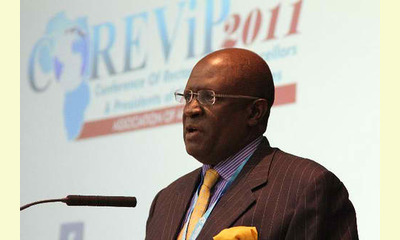|
|
Varsities vouch for peace ahead of general elections (Kenya)
un article par Xinhua News Service
The Kenyan university fraternity has joined the
rest of citizens in promoting initiatives to
promote peace during the polls set for March 4, so
as to avoid a recurrence of the 2008 post-election
violence that almost brought the country to the
brink of a civil war. The University of Nairobi,
through its Department of Sociology and Social
Work, on Monday rallied vice-chancellors from 41
universities in the country for a roundtable
dialogue dubbed “the role of the Universities in
creating a culture of peace.”

George Magoha, University of Nairobi Vice-Chancellor
click on photo to enlarge
Under the slogan “Wajibu Wetu” (Our
Responsibility), the roundtable, which also drew
participants from the private sector, government,
academia and student leadership from the public
and private universities in Kenya, discussed ways
of engaging Kenyans and University students to
understand, appreciate and practice the concept in
the context of peaceful coexistence.
“Universities are mandated with the task of nation
building and preparing students to become seasoned
agents of change,” University of Nairobi Vice-
Chancellor George Magoha told the participants in
Nairobi on Tuesday. “The clarion is a wakeup call
to the universities and development partners to
join hands and bring to the center stage the
reality that universities nurture so that they can
cultivate a culture of peace.” The vice-
chancellor told the dons that in the past, the
academia in Kenya has been seen as passive
bystanders during elections and reminded them not
to relent in putting efforts together.
“It is one thing to have ideas and another for the
ideas to have impact.” His counterpart from
Chancellor of Maseno University Dominic Makawiti
observed that the youth were evolving rapidly and
were exposed to massive information and therefore
the universities should engage them especially in
managing peaceful elections. . .
During the occasion, the University of Nairobi
released a documentary movie titled “Brother
Time”, a mythic story of the relationship of two
neighbors, whose friendship turns to conflict as
ethnic passions threaten to engulf them. In the
film, Wainaina’s harmonious relationship with his
neighbor Mutai suddenly changes into outright
hostility because they belong to different tribes.
The film’s producer Paul Mbatia, who is an
Associate Professor in the Department of Sociology
at the university, said peace, has to be worked at
by all Kenyans because they live In a country
characterized by fragile democracy. “Peace cannot
be assured at all times. We cannot be able to
build a culture of peace if our youth have not
embraced peace.” The rationale for “Wajibu Wetu”
project is to bring together Kenyan universities,
both public and private, to train university
students to prepare short messages and transmit to
the counties.
The short term activities are guided by the need
to prepare students to work with communities
before the general elections. Towards this end,
selected students from each county will be trained
in creation and maintaining of peace before and
during elections. The messages will also be used
for radio transmission in all local languages.
|








|
DISCUSSION
Question(s) liée(s) à cet article:
How should elections be organiized in a true democracy?,
* * * * *
Commentaire le plus récent:
CPNN receives more and more articles from Africa about initiatives that contest the European model of "winner-takes-all" elections, and demand that elections should only be part of a broader democratic process that seeks consensus and compromise.
This fits with the pre-colonial systems of justice in Africa, when there was no monotheism and no single supreme god, no single supreme law, no single "truth" provided by divine intervention, but rather a compromise among many different "gods," perspectives and "truths" arrived at through a process of mediation, for example, the "palabra."

|
|









